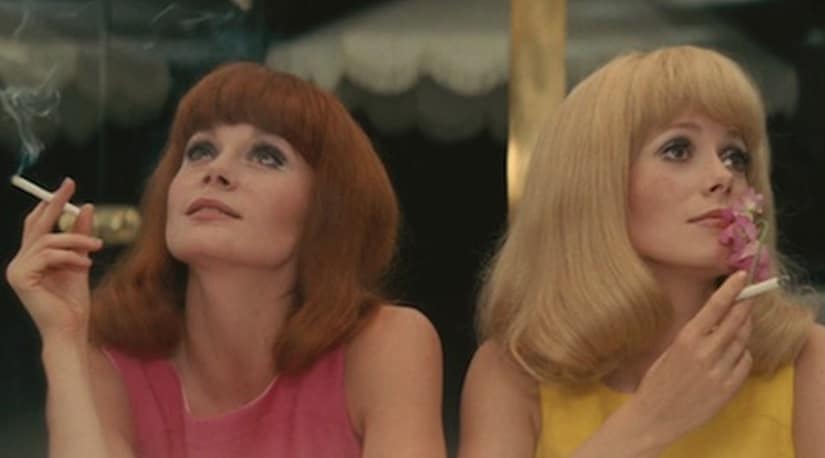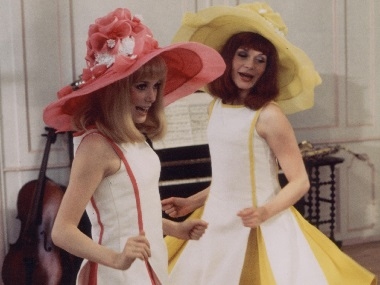In 1964, the French filmmaker Jacques Demy (aka Agnès Varda’s husband) made one of the most original musicals of all time: The Umbrellas of Cherbourg. The film was top-lined by Catherine Deneuve and Nino Castelnuovo, who – along with the other characters – sang not just the songs but also the dialogues. The first scene after the opening credits is set in a garage. A customer walks up to a mechanic, Guy Foucher (Castelnuovo), who is poking around under the hood of a car. The customer asks, “Is it finished?” Foucher looks up and replies, “The engine still knocks when it’s cold, but that’s normal.” The satisfied customer gets into the car and drives off. Foucher’s manager calls out, “Foucher! Can you stay an extra hour?” Foucher replies, “Tonight, it’s a problem. But I think Pierre is free.” He yells to Pierre, “Can you stay tonight?” These are not lyrics. These are lines. This is a conversation. And it’s all sung. [caption id=“attachment_6853031” align=“alignnone” width=“825”] Catherine Deneuve as Geneviève Emery and Nino Castelnuovo as Guy Foucher in The Umbrellas of Cherbourg[/caption] In a television interview featured in the Criterion Collection DVD of Cherbourg, Demy was asked about deliberately turning his back on “realism” when directors young and old were striving for it. “People don’t sing when asking for the salt in a restaurant or when asking someone to close the door,” the interviewer said. “Why ask people to sing when they have no reason to?” It’s an odd question, because if every artist set out to simply portray reality, or the world as we see and know it, Cubist art and the opera and sci-fi cinema wouldn’t exist. But Demy takes the question seriously. He says singing is a natural mode of expression. The interviewer persists. “Do you see people singing ‘I’d like apple pie!’ in a restaurant?” Demy smiles and says, “Why not! It would make life more pleasant.” To make life more pleasant: What a great reason to have actors singing and dancing on screen. Cherbourg is a sad story about star-crossed lovers, but the music, composed by Michel Legrand, lifts the heart. Had the lines been spoken, we might have laughed at the clichés: Geneviève’s (Deneuve) mother disapproves of her relationship with the penniless Guy, and when he goes off to war, she fixes Geneviève up with a rich suitor. But the now-iconic score makes every situation thing look as though we are experiencing it for the first time ever. Plus, this being a French New Wave film (its release was sandwiched between Godard’s Contempt and François Truffaut’s The Soft Skin), you could also see it as trying to do something else. It puts quotes around the Hollywood musical, where people spoke and suddenly burst into song, and says: “Why is that any less absurd than this?” In 1967, Demy made another musical with Legrand: The Young Girls of Rochefort. Once again, Deneuve (as Delphine) was the big draw, and this time, she appeared with her sister Françoise Dorléac (playing Solange). They play twins who yearn for an idealised version of love. After breaking up with an art gallery owner, Delphine sings: “I could tell you of his hands, of his eyes / I could go on and on until the next sunrise / He is handsome as only romantic men can be / Like divine Raphael his talent is heavenly / A philosopher in love with democracy / And a poet who rhymes endlessly.” At the end of the song, Solange sighs, “Sweetie, guys like that don’t hang out in Rochefort.” [caption id=“attachment_6853051” align=“alignnone” width=“825”]
 Françoise Dorléac as Solange Garnier and Catherine Deneuve as Delphine Garnier in The Young Girls of Rochefort[/caption] But note the differences from Cherbourg. For one, the lines are in verse form. They rhyme (eyes/sunrise; be/heavenly; democracy/endlessly). Two, Solange’s reply is spoken, not sung. And to add to the French New Wave-ness of this film, it features two actors best known for their work in Hollywood musicals: George Chakiris (who played the leader of the Sharks in West Side Story) and the legendary Gene Kelly, whose On the Town -- one of the canonical entries in Hollywood’s Golden Age of musicals – is evoked in a dance number featuring sailors. Like Cherbourg, Rochefort is a gorgeous-looking musical, filled with soft explosions of colours and seeking to do little more than… make life more pleasant for a couple of hours. But where Cherbourg leaned towards tragedy, Rochefort is sunniness all around. Yet, a cloud hangs over the movie. Rochefort was released on 8 March. Dorléac died a couple of months later, on 26 June (Her final film, Ken Russel’s Billion Dollar Brain, with Michael Caine, was released that December). Speeding to catch a plane at Nice airport, she lost control of her rented car and hit a signpost. The car flipped over and burst into flames. She struggled to get out, but could not open the door. Her body was identified only from the fragment of a cheque book, a diary and a driver’s license. What a gruesome story! After reading it, I have never been able to watch Rochefort the same way again, and even when I watched the film for this column, I kept thinking about how cruel life can be, and how important it is to embrace Demy’s philosophy and keep finding ways to make it more pleasant. Top-most among those ways is to watch a musical. Baradwaj Rangan is Editor, Film Companion (South).
Françoise Dorléac as Solange Garnier and Catherine Deneuve as Delphine Garnier in The Young Girls of Rochefort[/caption] But note the differences from Cherbourg. For one, the lines are in verse form. They rhyme (eyes/sunrise; be/heavenly; democracy/endlessly). Two, Solange’s reply is spoken, not sung. And to add to the French New Wave-ness of this film, it features two actors best known for their work in Hollywood musicals: George Chakiris (who played the leader of the Sharks in West Side Story) and the legendary Gene Kelly, whose On the Town -- one of the canonical entries in Hollywood’s Golden Age of musicals – is evoked in a dance number featuring sailors. Like Cherbourg, Rochefort is a gorgeous-looking musical, filled with soft explosions of colours and seeking to do little more than… make life more pleasant for a couple of hours. But where Cherbourg leaned towards tragedy, Rochefort is sunniness all around. Yet, a cloud hangs over the movie. Rochefort was released on 8 March. Dorléac died a couple of months later, on 26 June (Her final film, Ken Russel’s Billion Dollar Brain, with Michael Caine, was released that December). Speeding to catch a plane at Nice airport, she lost control of her rented car and hit a signpost. The car flipped over and burst into flames. She struggled to get out, but could not open the door. Her body was identified only from the fragment of a cheque book, a diary and a driver’s license. What a gruesome story! After reading it, I have never been able to watch Rochefort the same way again, and even when I watched the film for this column, I kept thinking about how cruel life can be, and how important it is to embrace Demy’s philosophy and keep finding ways to make it more pleasant. Top-most among those ways is to watch a musical. Baradwaj Rangan is Editor, Film Companion (South).
A look back at Jacques Demy’s two famous musicals , The Umbrellas of Cherbourg and The Young Girls of Rochefort.
Advertisement
End of Article


)
)
)
)
)
)
)
)
)



